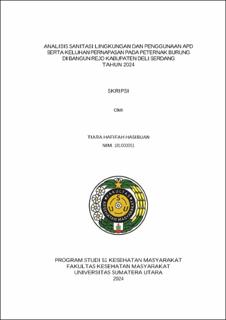Analisis Sanitasi Lingkungan dan Penggunaan APD Serta Keluhan Pernapasan pada Peternak Burung di Bangun Rejo Kabupaten Deli Serdang Tahun 2024
Analysis of Environmental Sanitation and PPE and Respiratory Complaints in Bird Breeders in Bangun Rejo Deli Serdang District in 2024

Date
2024Author
Hasibuan, Tiara Hafifah
Advisor(s)
Santi, Devi Nuraini
Metadata
Show full item recordAbstract
Bird farming in Indonesia is experiencing progress as seen from the increasing market demand for quail eggs based on data from the Central Statistics Agency, the figure for consumption of quail eggs in Deli Serdang Regency from 2022 was 0.143, increasing to 0.338 in 2023. This increasing market demand is a good business opportunity for breeders, but it can have a negative impact. Particles are one of the air pollutants in form of strong and unpleasant odor originating from bird droppings which contain ammonia gas. The problems currently occurring at quail farms in Bangun Rejo include condition of cage environment which is not cleaned every day, bird droppings are drying, feed and drink places are not cleaned every day, close to residential areas, and some breeders don’t use equipment. personal protective equipment (PPE). This study aims to determine the characteristics of breeders, environmental sanitation conditions, use PPE, and respiratory complaints at Bangun Rejo quail farm. The type of research used was descriptive research with a research population of 20 breeders. The sampling technique uses total sampling. The results of univariate analysis showed that livestock environmental sanitation met requirements for 3 farms (60.0%), the use PPE by breeders did not meet requirements for 3 farms (60.0%), and there were respiratory complaints among 11 breeders (55.0%). The majority of bird breeders in Bangun Rejo are men (60.0%) with the highest age group being 31-40 years (45.0%), the highest level of education being high school (60.0%), the breeder's work experience being more than 2 years (70.0%) with working hours less than or equal to 8 hours (65.0%). This research suggests that farmers must wear gas filter masks, clean the cage every day and pay attention to sanitation of farm environment, and breeders are advised to have regular health complaints can be detected early.
Collections
- Undergraduate Theses [3186]
